Arnold Schwarzenegger, Venus Williams and Scott Jurek rank among many professional athletes who fuel their performance through plant-based diets. In addition to the big names, athletes on our home turf also find strength and endurance through vegan and vegetarianism.
Lydia Roseman
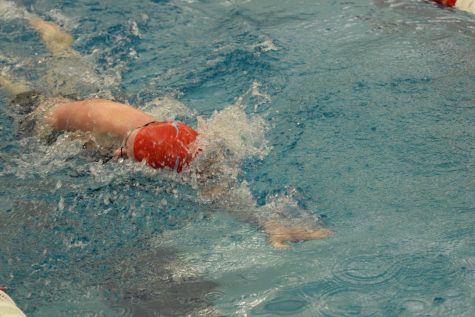
Senior Lydia Roseman competes at a swim meet.
After months of being vegetarian, senior swimmer Lydia Roseman was convinced to cut out dairy from her diet as well as meat by a friend who is a vegan professional athlete.
“He heard I was vegetarian, and he told me all of these interesting facts about being vegan and why it was more ethical to be vegan than vegetarian. I thought it sounded fun, and I wanted to try it,” Roseman said.
Roseman ultimately decided to continue a vegan diet for health and ethical reasons, and said being vegan has made her hair, skin and nails stronger as well as benefiting her overall health.
“Health-wise, everyone’s always talking about how you get your protein, [these people] just haven’t learned enough. There are so many other ways to get protein in fruits, nuts and legumes which can reduce cancer and heart disease which is a huge problem in the United States,” Roseman said.
Rather than feeling restricted or frustration about having to cut things out of her diet, Roseman instead felt she was able to expand her diet.
“I ended up really liking [the vegan diet] because I get to try new things all of the time, and I like what I eat all of the time,” Roseman said. “I understand why people think it’s not sustainable, but there are so many ways to expand your diet and challenge yourself.”
This swim season is Roseman’s first since becoming vegan. The only adjustment she has made is bulking up on the food she eats in order to be properly fueled.
“I’ve almost needed to double the things that I’m eating and having full meals for breakfast, lunch and dinner,” Roseman said. “For me, meat and dairy physically weigh me down, [so] my strength and nutrients come from plants.”
Brinda Ambal
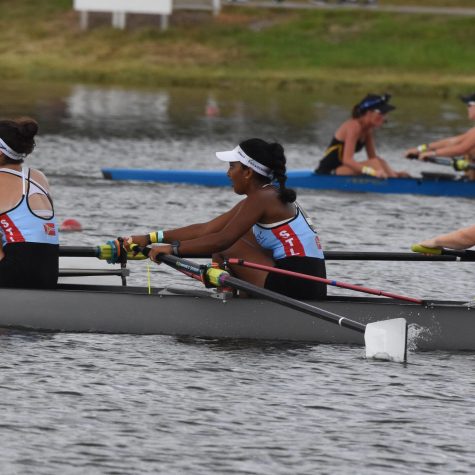
Sophomore Brinda Ambal rows her team to success at a regatta.
In line with her Hindu religion, sophomore Brinda Ambal has been vegetarian her whole life. She began rowing in eighth grade and at first struggled to accommodate her diet to her lifestyle.
“Before eighth grade, I didn’t play many sports. Then I tried out for rowing, and it was a switch from zero hours a week to 12-15,” Ambal said. “As I got more into rowing, we started to do harder workouts, and it was more important to stay fueled.”
Increasing her activity made Ambal question if her diet was sustainable, but by researching and learning more about the vegetarian diet, she was able to adjust her food intake to better prepare herself for rowing.
“A way you can get protein arguably better by being vegetarian is by having a better balance and spreading your protein throughout the day. I definitely think [having balance] is an asset, and I think I can perform better,” Ambal said.
By becoming educated through books and documentaries such as “Forks Over Knives“, Ambal now feels she would choose to be a vegetarian even if she didn’t have to be.
“Becoming educated about it was one of the best things I could do because before, I had a mindset that I wouldn’t get enough protein or would always be a step behind,” Ambal said. “There was a point where I was questioning what I should eat, but now I know what is good to put in my body.”
Ja’Marion Wayne

Sophomore Ja’Marion Wayne surveys the field on a Friday night game.
Influenced by his cousin, sophomore varsity football player Ja’Marion Wayne has been a vegetarian for three years.
“I chose to be a vegetarian because I read and watched videos about how meat is made and my cousin who plays football had been a vegetarian for five years, so I thought I might as well do that,” Wayne said.
The varsity football team frequently has team meals, and even though Wayne can not eat the meat served, he never feels left out.
“Sometimes if we go out to eat, everyone orders wings and I get a salad, or we’ll have sandwiches and I get a cheese sandwich,” Wayne said. “I never feel left out because I always have an option.”
As a high-performing athlete, Wayne feels like his diet gives him a different advantage compared to his competitors.
“[Being] a vegetarian is better for your health, and I feel like I have more energy,” Wayne said. “I feel like I have something that other people don’t have.”
Ben Taylor

Sophomore Ben Taylor prepares to cross the finish line at a cross country meet.
First becoming vegan for ethical reasons, sophomore Ben Taylor has since found that the vegan diet has enhanced his athletic performance.
“Over time, since I’ve become more of an athlete, [I’ve been vegan] for more performance-based reasons,” Taylor said. “It can affect your recovery time between workouts, and I [feel] more energized and have more energy throughout the day.”
Taylor ensures he has enough protein to fuel his workouts by eating the right combinations of food and using supplements.
“Protein can be found in so many things that people don’t think about, like beans, lentils and nuts, and when you put those together, you have enough protein. Even if you can’t find enough, you can always use supplements,” Taylor said.
The vegan diet has also been a way for Taylor to eat more nutritious foods.
“Having a vegan diet inherently makes you healthier and stronger, so I think it helps to be a better athlete because it’s just straight up healthier food,” Taylor said.
For other students and athletes considering a plant based diet, Taylor recommends making gradual changes to be more conscious.
“I made a mistake going straight into veganism, and it was kind of a shock to my system,” Taylor said. “I know people do meatless Mondays and try increasing plants and vegetables and decreasing red meat. I think it’s a great alternative.”

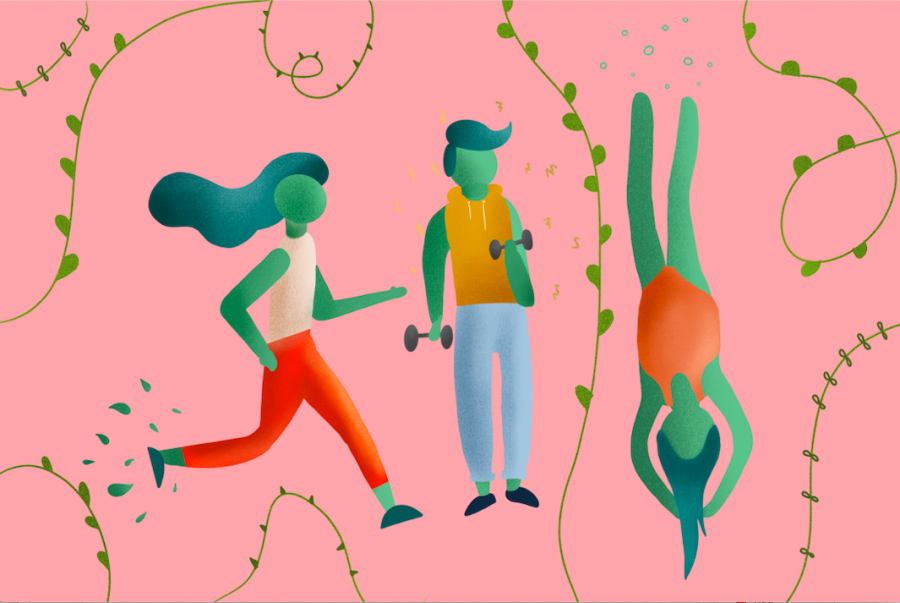


![After a thrilling point, senior Katie Byergo and junior Elle Lanferseick high-five each other on Oct. 8. With teamwork and camaraderie, Byergo worked together in the game against Lafayette High School. “[Byergo’s] is really positive with a good spirit,” Lanferseick said. “I set her [the ball] and she hits it [or] gets the kill.”](https://pwestpathfinder.com/wp-content/uploads/2025/10/DSC_9349-1-e1761159125735-1200x791.jpg)
![Focused on providing exceptional service, sophomore Darsh Mahapatra carefully cleans the door of a customer’s car. Mahapatra has always believed his customers deserve nothing less than the best. “[If] they’re trusting us with their car and our service, then I am convinced that they deserve our 100 percent effort and beyond,” Mahapatra said.](https://pwestpathfinder.com/wp-content/uploads/2025/10/DSC_0018-1200x800.jpg)
![Sophomore Aleix Pi de Cabanyes Navarro (left) finishes up a soccer game while junior Ava Muench (right) warms up for cross country practice. The two came to Parkway West High School as exchange students for the 2025-2026 school year. “The goal for the [exchange] program is to provide opportunities for both Parkway students and our international exchange students to learn about other cultures, build connections and become confident, capable, curious and caring — Parkway’s Four C’s — in the process,” Exchange Program Lead Lauren Farrelly said.](https://pwestpathfinder.com/wp-content/uploads/2025/10/Feature-Photo-1200x800.png)
![Leaning on the podium, superintendent Melissa Schneider speaks to Parkway journalism students during a press conference. Schneider joined Parkway in July after working in the Thompson School District in Colorado. “My plan [to bond with students] is to get things on my calendar as much as possible. For example, being in [classes] is very special to me. I am trying to be opportunistic [meeting] kids [and] being in [the school] buildings. I have all the sports schedules and the fine arts schedules on my calendar, so that when I'm available, I can get to them,” Schneider said.](https://pwestpathfinder.com/wp-content/uploads/2025/09/IMG_5425-1200x943.jpeg)
![Gazing across the stage, sophomore Alexis Monteleone performs in the school theater. The Monteleone family’s band “Monte and the Machine” has been releasing music since 2012, but Alexis started her own solo career in 2024 with the release of her first single, Crying Skies. “My whole family is very musical, [and I especially] love writing [songs with them],” Monteleone said.](https://pwestpathfinder.com/wp-content/uploads/2025/09/DSC7463-1200x798.jpg)

![Leaping through the air, senior Tyler Watts celebrates his first goal of the season, which put the Longhorns up 1-0 against the Lafayette Lancers. Watts decided to play soccer for West for his last year of high school and secured a spot on the varsity roster. “[Playing soccer for West] is something I had always dreamed of, but hadn’t really had a good opportunity to do until now. It’s [really] fun being out [on the field], and I’m glad I decided to join the team. It’s just all about having fun with the boys and enjoying what time we have left together,” Watts said.](https://pwestpathfinder.com/wp-content/uploads/2025/09/DSC_1951-1200x855.jpg)

![Shifting global trade, President Donald Trump’s tariffs are raising concerns about economic stability for the U.S. and other countries alike. “[The tariffs are] going to pose a distinct challenge to the U.S. economy and a challenge to the global economy on the whole because it's going to greatly upset who trades with who and where resources and products are going to come from,” social studies teacher Melvin Trotier said.](https://pwestpathfinder.com/wp-content/uploads/2025/05/MDB_3456-1200x800.jpg)

![The varsity boys cross country team poses for a photo at the Mike Rose Soccer Complex in Memphis, Tenn. The Memphis Twilight Classic is the largest event the team attends. “[I enjoyed] hanging out with the team every day at practice,” Patten said. “I wanted to be the best I could for my team; I really wanted to help out.”](https://pwestpathfinder.com/wp-content/uploads/2025/09/XC-PHOTO-1200x822.jpg)

![Celebrating their landmark victory, the Parkway West Boys Hockey team gathers together on the ice. Over the course of the season, the team grew closer together while pursuing their final goal: winning the coveted Wickenheiser Cup. “[Winning the cup] was awesome. [As] a senior, it was super rewarding to end on a high note. It had to be the most memorable part of my career,” varsity hockey player and senior Hunter Beach said.](https://pwestpathfinder.com/wp-content/uploads/2025/03/DSC3974-Enhanced-NR-1200x799.jpg)
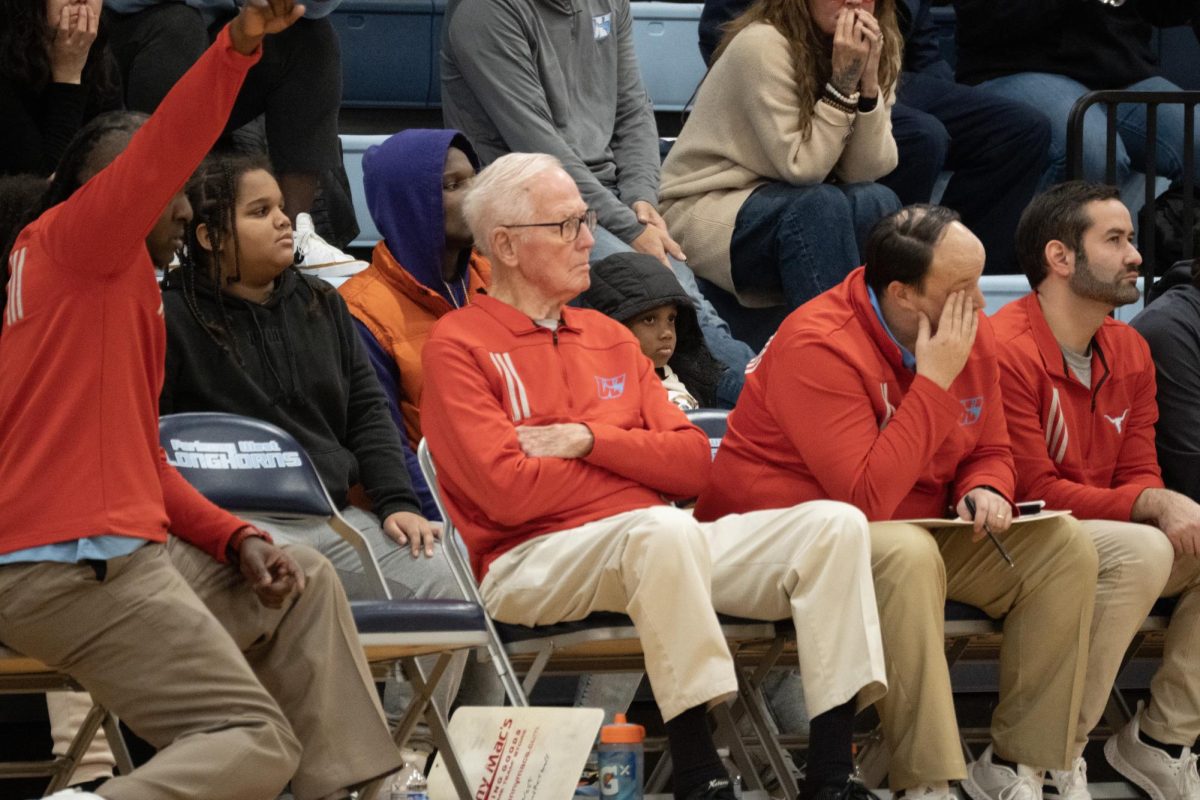
![Holding the disc, senior Nathan Thompson waits for an opportunity to pass to senior Timmy Fry. Parkway United’s ultimate frisbee team is made up of students from each of the four Parkway schools. “The one thing I really like about ultimate [frisbee] is the community because it’s so different from any other sport I've been a part of. [My] national teammates are people who we play against in the regular season, so we see each other all the time. It's always fun hanging out with [them],” Thompson said.](https://pwestpathfinder.com/wp-content/uploads/2024/12/C96A6823-1200x800.jpg)
![Senior Josie Grunzinger watches the football game intently from the sidelines on Oct. 18. Grunzinger stood out to the crowd as the only girl on the football team, encouraging other girls who want to play football to take a chance and go for a sport outside of their comfort zone. “If you think you could [play football] and you want to do it, just try it, because all it takes is to actually try it out,” Grunzinger said.](https://pwestpathfinder.com/wp-content/uploads/2024/10/Untitled-design-1200x675.png)

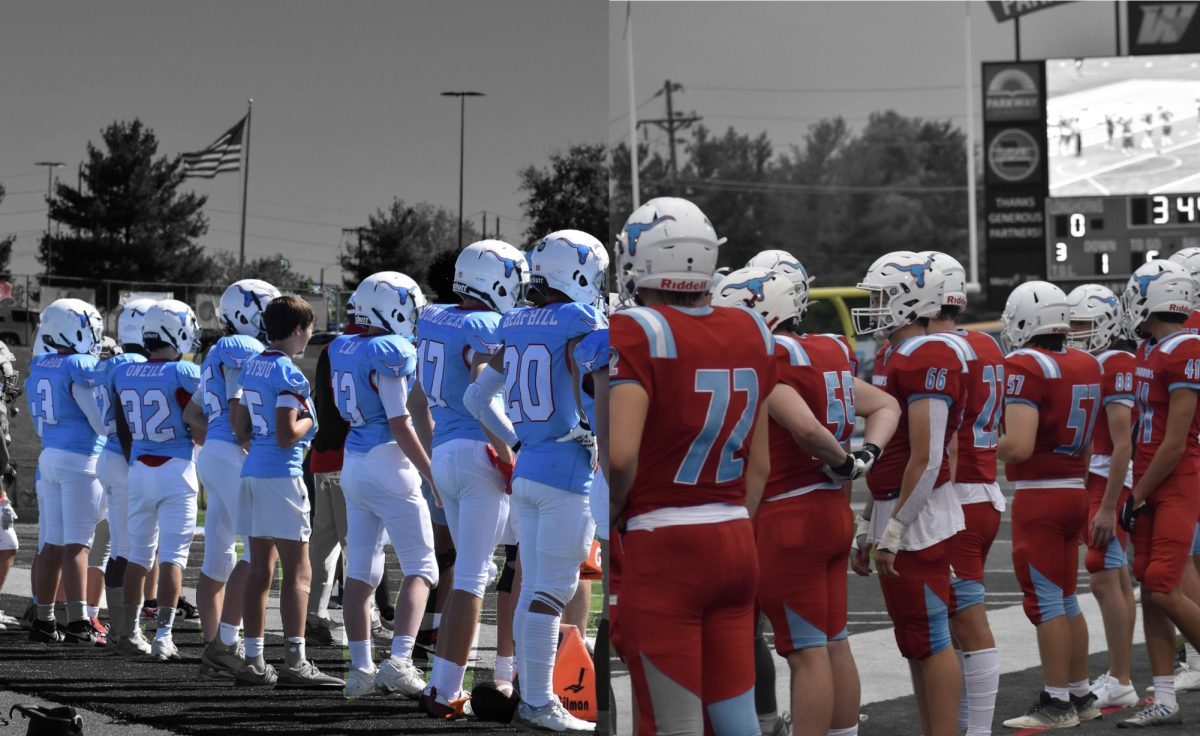
![With her arms held high, junior Jenna Rickelman throws the ball across the pool during a girls water polo practice. With hours of practice after school and over the summer, Rickelman saw many improvements in her water polo skills. “When I look at [my] stats, I'm so much better than I was last year,” Rickelman said.](https://pwestpathfinder.com/wp-content/uploads/2024/05/Untitled-design-2-.png)
![Putting on his helmet, catcher and senior Tommy Eschbach prepares to get in his primary stance. Despite losing 6-1 against Eureka on April 16, Eschbach didn’t let the tough loss affect his playing or mental health. “It's [so] easy to get caught up in the sport and what you're doing that [after] one bad game or a stretch of games it is hard to remind yourself that your worth as a person isn't directly related to your performance on the field,” Eschbach said.](https://pwestpathfinder.com/wp-content/uploads/2024/05/DSC_0415-1-1-1200x800.jpg)

